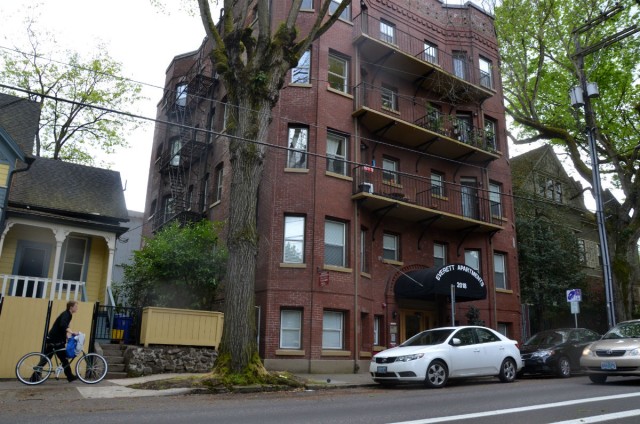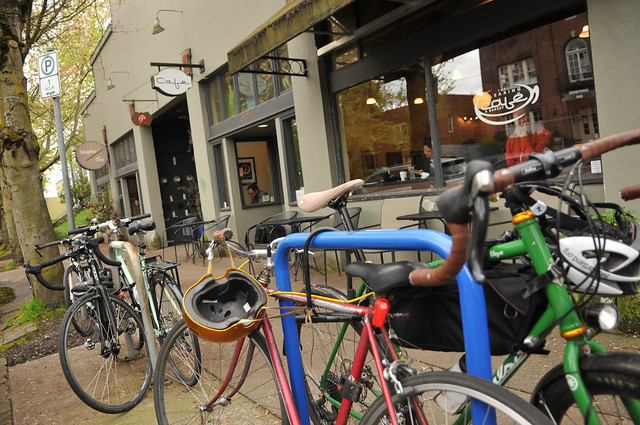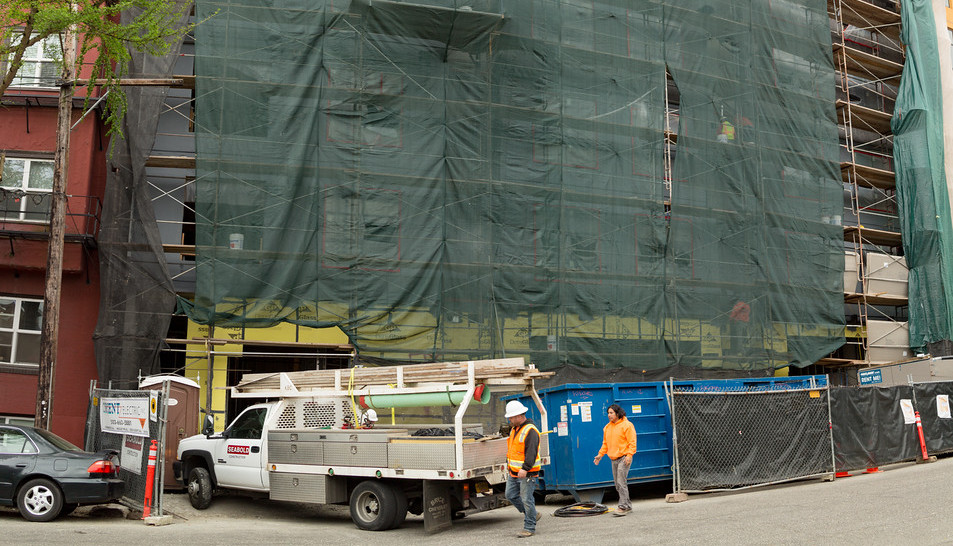
(Photo: Ted Timmons)
Portland’s City Council will meet Wednesday to consider a new mandatory parking requirement that, if it had existed for the last eight years, would have illegalized 23 percent of the new housing supply in northwest Portland during the period.
The Tess O’Brien Apartments, a 126-unit project that starts pre-leasing next week and will offer some of the cheapest new market-rate housing in northwest Portland, couldn’t have been built if they’d been required to have 42 on-site parking spaces, its developer said in an interview.
“Do the math,” Martin Kehoe of Portland LEEDS Living said Friday. “The apartments at the Tess O’Brien are between $1250 and $1400 a month. If we were required to build parking, you’d be between $1800 and $2000 a month. … It probably just wouldn’t have been built. And then what’s that going to do to the existing project that’s out there and has been built? It’s just going to drive the rents of those up.”
Kehoe said the Tess O’Brien units, which average 330 square feet, are intended for people who don’t own cars.
“We’ve got free bike parking rooms, you’re a block off the bus, you’re a block off streetcar, you’ve got access to Uber whenever you want it,” he said. “People who move into these apartments … they don’t have cars.”
The proposal up for debate on Wednesday would apply the same rule to the Northwest District, immediately west of Interstate 405, that applies in other neighborhoods outside the central city: buildings with 31 to 40 homes would need at least one parking space for every five units. Buildings with 41 to 50 homes would need one space for every four units. Buildings with 51 or more homes would need one space for every three units.
Mandatory parking minimums would have driven up the construction cost of 305 new homes built in northwest Portland since 2008.
Including the Tess O’Brien Apartments, those mandatory parking minimums would have driven up the construction cost of 305 new homes built in northwest Portland since 2008, city data show, potentially by enough to kill the five new buildings in question. That’s 23 percent of the 1,339 units that were added to northwest by buildings of 10 or more units.
For comparison’s sake, if those 305 new no-parking homes were in a single building, it would have been the sixth largest built in Portland since at least 2000. The largest new building in the Lloyd District, for example, added 337 units to the city’s housing supply.
But most new homes in northwest Portland are in buildings where developers opted to build more than the minimum amount of parking, usually much more, suggesting that new no-parking buildings are a niche market in the Northwest District.
‘We certainly should have the option of no parking’
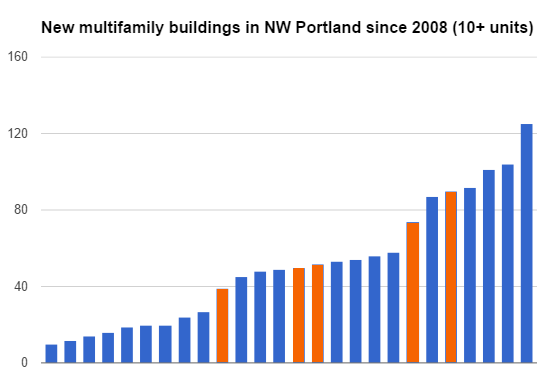
(Data: Bureau of Planning and Sustainability. Chart: BikePortland.)
Portland rental vacancy rates have been below 5 percent since 2008. Last year, monthly rent in the average apartment rose $100, with hikes concentrated mostly in older units. In April, the local Barry Apartment Construction Report saw housing supply finally keeping up with demand (a trend confirmed by May Census figures) but still not increasing fast enough for a significant rise in vacancies.
Local home purchase prices, too, have been rising at the fastest rates in the nation.
“It won’t end until we have more balance between supply and demand in the housing market,” University of Oregon economist Tim Duy told The Oregonian last week.
“Demand is severely outpacing supply,” the news report said.
Margot Black, an organizer for the advocacy group Portland Tenants United speaking for herself, said in an interview Monday that she’d spoken with Portland Commissioner Steve Novick last week to oppose new parking minimums in northwest.
“Right now, we should not be doing anything that restricts supply and increases prices,” said Black. “We certainly should have the option of no parking if that means we could have more units at a lower price.”
Parking advisory committee: Every building brings more cars
The proposal to bring parking minimums to the Northwest District comes from the volunteer Northwest Portland Parking Stakeholder Advisory Committee.
“At least half of our committee did not use to support parking minimums,” said Rick Michaelson, who chairs that committee and supports minimums. “We see that the transit system has not expanded rapidly.”
Michaelson said that even in the Footprint apartments, another 50-unit microapartment building in northwest, 16 units have signed up for street parking permits.
“We’re going to see a minimum of 30 percent even for these microapartments,” he said. “We think it’s a fairness issue. We think we need as many opportunities to get the system in balance and make sure that everybody contributes to the parking infrastructure.”
“9700 parking permits have been issued that are competing for the 4100 spaces.”
— Karen Karlsson, NW Portland Parking Stakeholder Advisory Committee
Michaelson predicted that city rates for street parking will go up, which will lead to more demand for off-street parking in the future. He also said a project similar to Tess O’Brien might have penciled out even with 42 on-site parking spaces.
“Some developers are choosing to have parking without affecting the bottom line,” he said.
Michaelson said his committee had discussed other ideas for affordability such as not counting below-market-rate units toward a building’s total, or exempting buildings that offer free TriMet passes to residents.
Karen Karlsson, who also serves on the committee, said her “bottom line” is that “9700 parking permits have been issued that are competing for the 4100 spaces.”
“We really need to find a way to help balance the supply and reduce the demand,” she said. “We need every tool that we can get.”
Advertisement
Council will hold hearing Wednesday and may vote

(Photo: J.Maus/BikePortland)
Portland Commissioner Steve Novick said Friday that because he assumes “markets operate like markets,” requiring on-site parking in buildings in transit-oriented neighborhoods does tend to drive up housing costs by reducing the supply of new housing.
But Novick said he is considering support for a new parking minimum anyway, at least in the short term, because minimums already exist in most of the city.
“I generally am not excited about constructing lots of new parking,” Novick said. “I don’t think we should continue to build society around the car if we are going to take our climate goals seriously. [But] I am much more sympathetic when folks come from a neighborhood that has meters, has a permit system, has a fair amount of density, and say ‘Hey, we want to be treated the way other folks are treated.'”
The central city, which includes the Pearl District in inner northwest, doesn’t have parking minimums. As in northwest, developers there usually opt to include on-site parking as an amenity for residents who choose to pay extra for it.
Most of the buildings that define northwest Portland were built before the city’s first parking requirements.
But many older apartments and condos in northwest Portland, maybe even most of them, have zero on-site parking. That’s because most of the buildings that define northwest Portland were built before the city’s first parking requirements, which probably date to the 1950s.
In fact, one older apartment building in the district without on-site parking belongs to Michaelson’s real estate company.
For the second half of the 20th century, most new apartment and condo buildings in Portland had garages or parking lots attached. In 2000 the city council, led by then-Commissioner Charlie Hales, eliminated parking minimums for units close to frequent-service transit lines. Starting in 2008, as Portland’s rents began their recent climb, some developers began to secure loans for buildings without on-site parking.
In most of those buildings around Portland’s east side, half or more of households in the no-parking buildings owned at least one car. That meant parking spillover, which led to a backlash from some neighbors.
In 2013, Hales (newly elected as mayor) led approval of what he described as a stopgap measure to require parking at most new buildings of 30 units or more, even if they were within a block of a frequent transit line. But there was one exception: the Northwest District, which was already in the midst of a parking reform program.
Demand-based parking group organizing opposition to rule
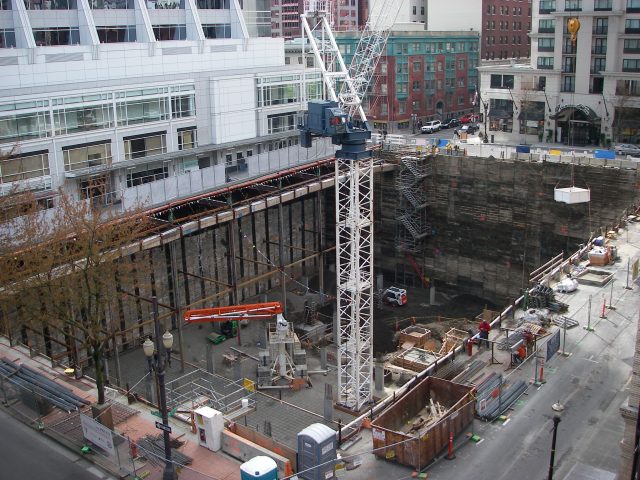
(Photo: GRI.com)
In the three years when many apartment buildings in Portland were being constructed without parking, from 2011 through 2013, average construction costs per apartment fell even though construction costs for other units didn’t.
Then, after parking minimums were reinstated for most transit-oriented buildings in 2013, average construction costs per apartment shot back up even though construction costs for other units didn’t.
Tony Jordan of the group PDX Shoupistas, which advocates for demand-based parking policy, found that the number of buildings going up in Portland with exactly 30 units — the maximum size a transit-oriented building can be in most of the city without triggering parking minimums — is apparently about to soar. There are currently 14 such buildings in development, he calculated last week.
According to city permit data obtained by BikePortland under state open records rules, that compares to eight such buildings over the last 15 years.
Jordan is organizing people to contact the city council Tuesday and/or testify on Wednesday to oppose new minimums.
“In times like this, proposals which curtail the supply of new housing and increase rents should be dead on arrival,” Jordan wrote Monday. “A vote for minimum parking requirements is a vote to make the housing crisis worse.”
Novick says citywide reform is an option, but not yet
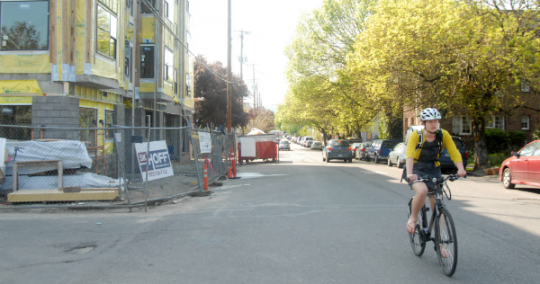
(Photos: M.Andersen/BikePortland)
In an interview Friday, Joan Frederiksen of the Bureau of Planning and Sustainability said the city staff does not see a “tradeoff” between space for parking and space for people.
“I wouldn’t use the word tradeoff,” she said. “I think it’s more about balancing. … With this project we are echoing the direction council provided back in 2013, finding that balance between parking and affordability.”
Matt Grumm, a senior policy manager for Housing Commissioner Dan Saltzman, put things differently.
“There’s no doubt that these are tradeoffs,” he said. “Parking minimums potentially increase the cost of that housing.”
Grumm said his boss would “wait for the hearing” before deciding how to vote but suggested that maybe developers who opt to include below-market-rate units in their buildings should get a break on parking requirements.
“It’ll be interesting to see if that gets any traction,” he said.
In an email last week, Hales spokeswoman Sara Hottman said the mayor supports the proposal to “extend the City’s minimum parking requirements to the Northwest Plan district.”
There are two other votes on the council: Nick Fish, who proposed the 2013 parking minimums that were passed into code, and Amanda Fritz.
Both Novick and Frederiksen suggested that the city might consider amending its citywide parking minimums at some point in the future.
“Even if we wind up applying parking minimums in northwest next week, I’m really encouraged that I’ve been hearing people opposing parking minimums,” Novick said. “Once we have those new tools available, one option is to revisit the parking minimum requirements throughout the city.”
Novick didn’t respond to a question about when the council is likely to consider his proposal that would let neighborhoods create their own parking permit districts.
Eudaly: “We must start decreasing our reliance on the personal automobile”
Chloe Eudaly, who is running on a housing-affordability platform to replace Novick on the city council, said in an email Monday that she opposes new minimums:
Portland is going through growing pains right now and traffic congestion and parking are high on the list of concerns, but what’s even higher is housing affordability. So when we’re talking about a policy that would increase the cost of housing and decrease the number of units built, such as minimum parking standards for new multi-family developments, we need to consider our options and their impacts very carefully.
I respect the work of the NW Parking SAC, as an almost 20-year former resident of NW Portland I know what a headache parking has become in the area, but I don’t support their proposal of a blanket minimum parking standard for all new multi-dwelling developments of more than 30 units. Knowing that these spaces are likely to be underutilized in many developments and that we must start decreasing our reliance on the personal automobile, I believe we can and must come up with a more nuanced approach, especially in a neighborhood that is so central, dense, and transit-friendly (many NW residents live within 10 blocks of the street car, Max, AND a bus line).
Instead of requiring more parking space, Eudaly suggested requiring developers to offer bus passes, bike-share or car-share memberships, creating shared parking options, and raising on-street permit prices “to more closely reflect the actual cost of providing street parking.”
Other options she suggested included shared parking garages and a “live where you work” program. She, too, suggested a parking exemption for developers that include below-market-rate units.
Black, the tenants organizer, said Portland is facing a difficult transition away from a “small town” where most trips happen by car and most homes have private yards, driveways and “a picket fence.”
“It’s great if you got it, but it’s mathematically impossible for all of us to have it,” she said. “I see Portland really struggling to make this shift into a city from this small-town feel. … We need to shepherd Portland through that paradigm shift.”
— Michael Andersen, (503) 333-7824 – michael@bikeportland.org. The Real Estate Beat is a regular column. You can sign up to get an email of Real Estate Beat posts (and nothing else) here, or read past installments here.
Our work is supported by subscribers. Please become one today.


